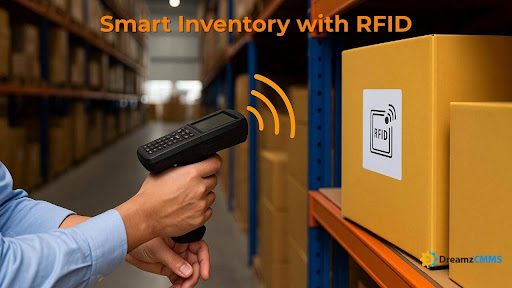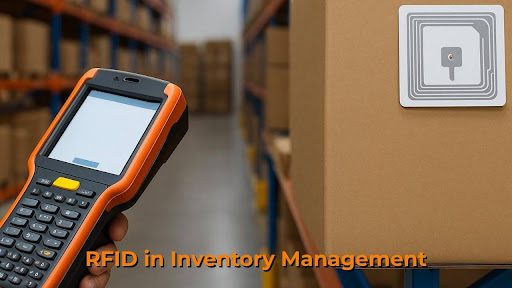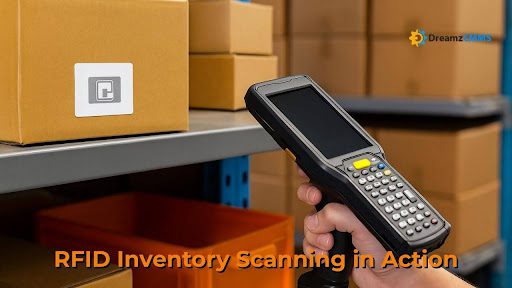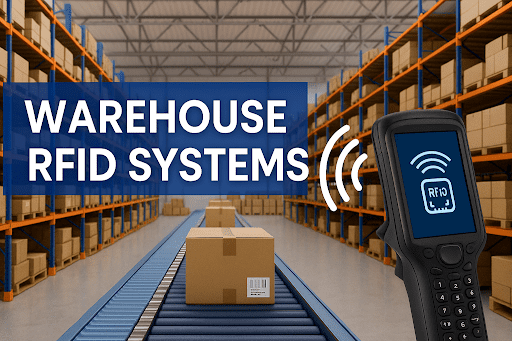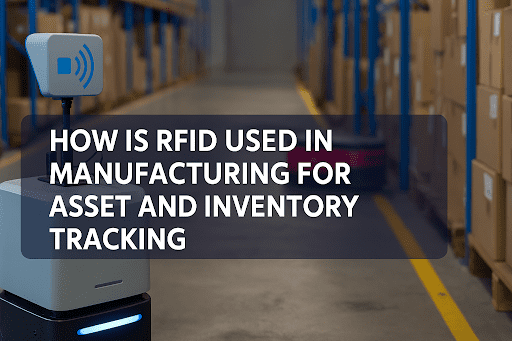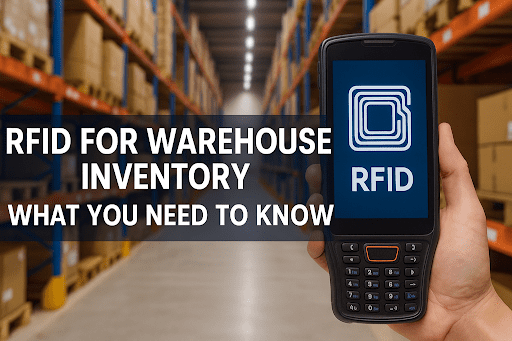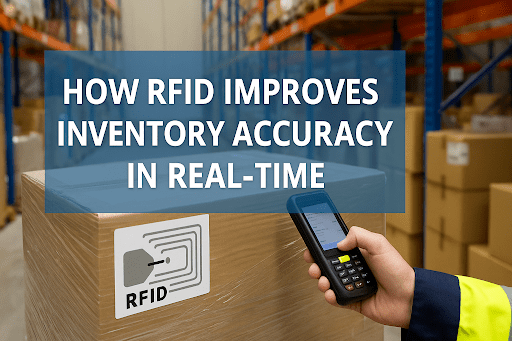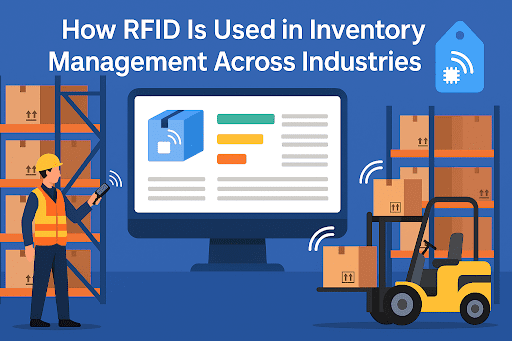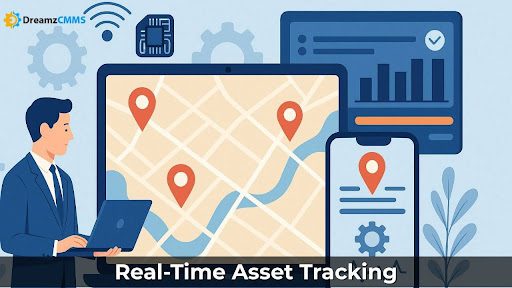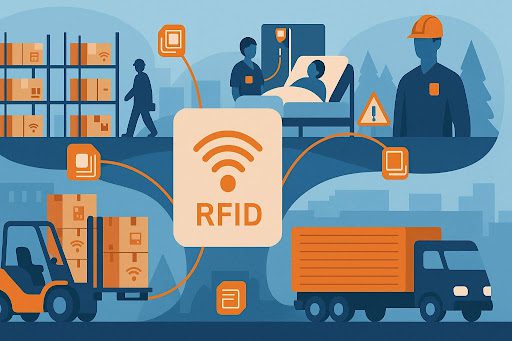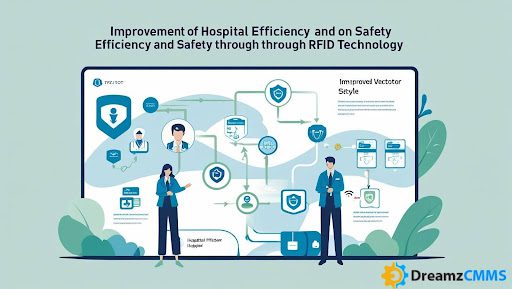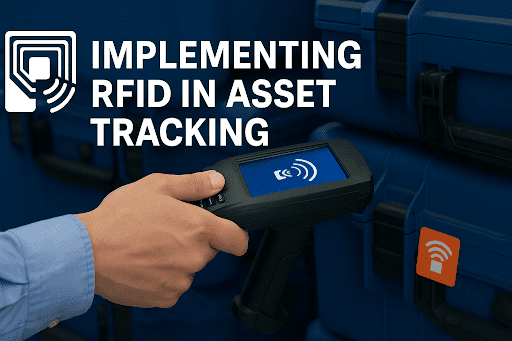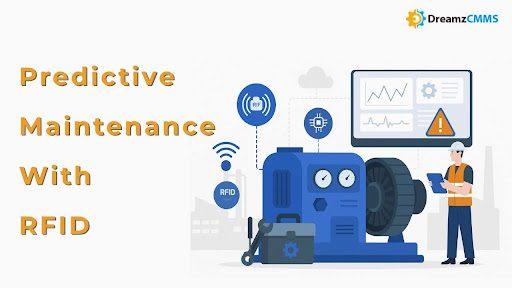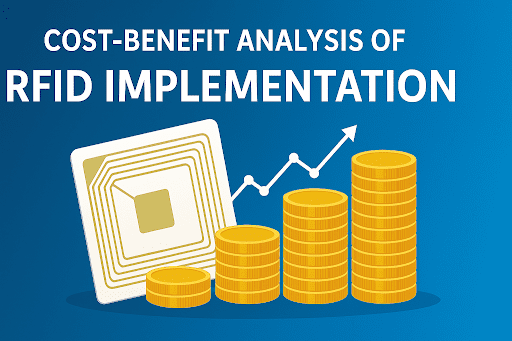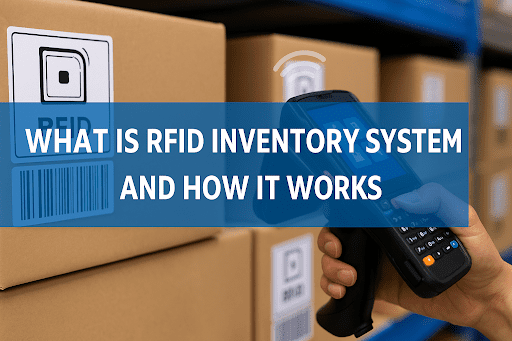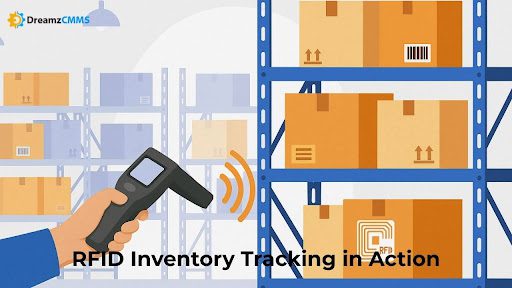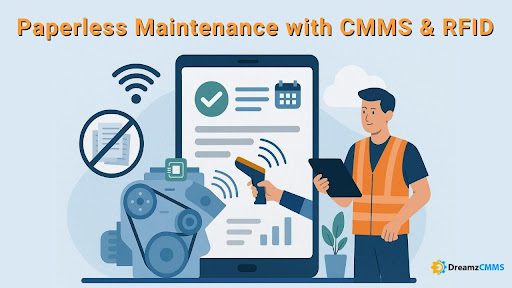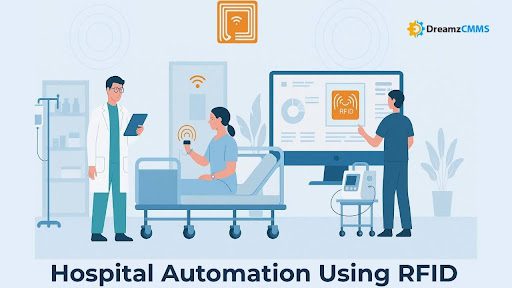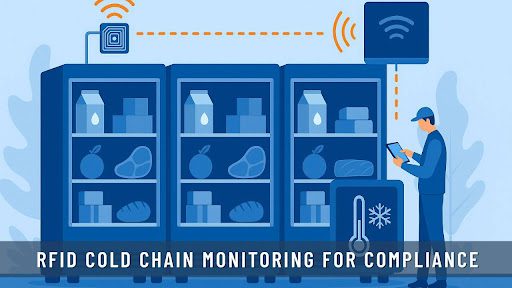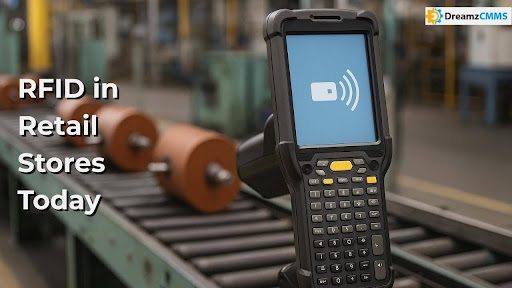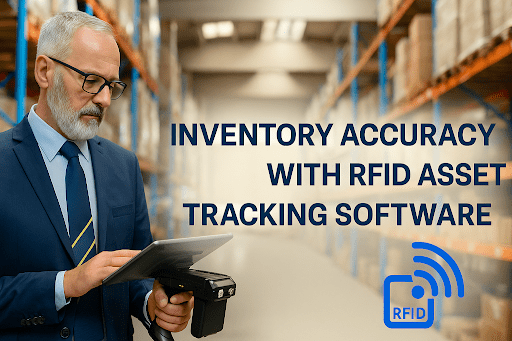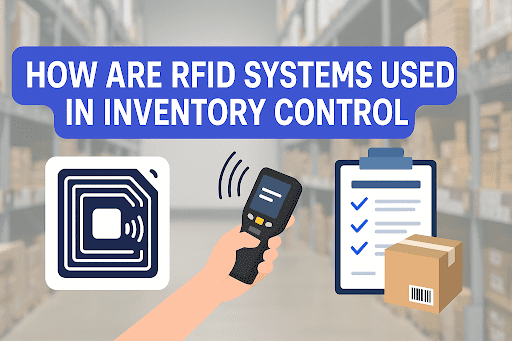 BACK TO Blog
BACK TO Blog
Asset Rental Management
RFID Asset Tracking
Benefits of RFID in Warehouse Management
- August 13, 2025
- DreamzCMMS Team
- 9 minutes read
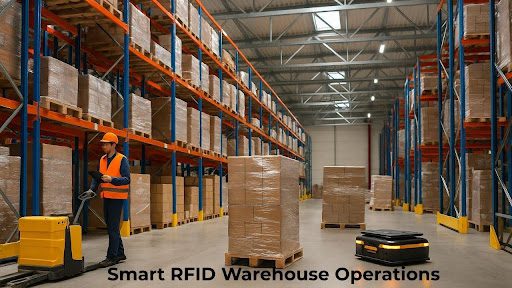
- August 13, 2025
- DreamzCMMS Team
- 9 minutes read
The supply chain operations of today require warehouse services to provide both fast delivery and precise handling at budget-friendly rates. Radio Frequency Identification technology functions as a transformative force that restructures warehouse operations throughout the world. Warehouse management implementation of RFID technology produces multiple benefits through real-time inventory tracking and labor reduction and productivity increases.
This complete blog analyzes multiple RFID warehouse management advantages while illustrating RFID solutions that improve operational workflows and decrease costs while increasing accuracy in warehouse environments.
Improve Uptime with RFID-Driven Maintenance InsightsThe combination of asset usage tracking through RFID along with automatic work order creation minimizes equipment downtime.The implementation of smart data systems allows organizations to boost equipment reliability which extends the lifespan of their assets during warehouse operations. Asset Maintenance Management Software |
What is RFID in Warehouse Management?
The identification and tracking system based on radio waves functions by using tags which are attached to objects. The tags contain electronic data which RFID readers can detect without needing direct access as they do with barcodes.
RFID tags function in warehouse environments by being placed onto merchandise and pallets as well as containers. The RFID system captures real-time data when items move across the warehouse through RFID readers which provide an automatic digital tracking system for stock movements.
Learn more about the basics: What is RFID Asset Tracking?
1. Real-Time Visibility: A Game Changer
Real-time visibility stands as the most significant beneficial advantage that RFID technology provides to warehouses.
Real-Time Warehouse Visibility with RFID
The location of products becomes instantly accessible through RFID because managers can see their products either on shelves or in transit or during the shipping pick-up process. This continuous data stream:
- Eliminates the need for manual scanning
- Reduces item misplacement
- Enables faster stock location and retrieval
The real-time visibility allows organizations to make quicker decisions while achieving greater warehouse operational agility.
Also read: RFID Event Tracking for Enhanced Movement Monitoring
2. Improved Accuracy and Error Reduction
Human errors prove to be the leading factor which makes warehouse operations less efficient. Barcode scanning systems need both direct line-of-sight observation and manual operation for scanning which makes errors more likely to occur.
RFID Warehouse Accuracy Improvements
RFID systems achieve automatic data capture with accuracy rates reaching nearly 99% in most cases.
- Bulk item identification happens automatically through the system without requiring human involvement
- The inventory audit process becomes both faster and more reliable through this system.
- Scanning errors which result from incorrect barcodes and missing items become almost nonexistent.
RFID Warehouse Error Reduction
The system achieves high accuracy which results in fewer stock discrepancies and reduces customer complaints while building stronger inventory trustworthiness.
Related: How to Improve Asset Tracking Accuracy
3. Increased Productivity and Labor Savings
The speed of RFID operations leads to substantial reductions in labor requirements for manual work.
RFID Warehouse Labor Reduction
With RFID:
- The process of item scanning becomes unnecessary because workers can check contents without opening containers
- The automated check-in and check-out systems help save time during the receiving and shipping operations.
- Inventory counts can be completed in hours instead of days
RFID Warehouse Productivity Gains
The automated process leads to greater worker output which in turn increases overall warehouse efficiency and employee contentment.
4. Enhanced Inventory Management
The accuracy of inventory management serves as an essential factor to stop both stockout situations and overstock scenarios. RFID systems provide instant access to real-time data which is simple to process.
RFID Warehouse Tracking Benefits
RFID allows:
- The system enables uninterrupted cycle counting operations for ongoing warehouse activities.
- Instant alerts on misplaced or misrouted items
- Inventory management software benefits from integration to enhance forecasting accuracy.
RFID Warehouse Optimization Advantages
Better data enables managers to optimize inventory levels and enhance reorder points and decrease deadstock quantities.
5. Better Space Utilization
The RFID warehouse optimization advantage of better space management stands among the benefits that RFID technology offers. The use of RFID technology allows businesses to store products at higher densities in their facilities without losing accessibility.
- The detection of items becomes possible in dense storage areas through readers without requiring direct line-of-sight access.
- The automated inventory system determines the best storage locations.
- The implementation of space-saving layouts does not need to compromise operational efficiency.
6. Faster Receiving and Shipping
The value of time determines success in warehouse logistics operations. The implementation of RFID technology reduces significantly the time needed to handle items entering and leaving the facility.
RFID Warehouse Automation Benefits
With RFID:
- Dock-door readers automatically perform inventory logging for incoming goods.
- Bulk order verification at the time of shipping helps verify accuracy.
- The time needed for trucks to complete their deliveries decreases.
The faster order processing along with improved customer satisfaction and higher throughput results from this change.
7. Advanced Analytics and Reporting
The implementation of RFID technology produces an immense quantity of useful information.
- Track movement patterns of goods
- Analyze bottlenecks in the workflow
- Measure employee productivity based on task duration
The analytics serve as a basis for warehouse management RFID solutions that implement AI and predictive models to enhance operational efficiency.
8. Cost Savings Through Automation
The initial expenses of RFID installation yield substantial financial returns.
RFID Warehouse Cost Savings
Cost savings come from:
- Automation helps organizations cut down their workforce expenses.
- Lower inventory carrying costs
- Decreased shrinkage and theft
- Reduced loss from expired or outdated stock
The continuous accumulation of savings through RFID investments results in this technology becoming an intelligent long-term choice.
Try RFID Asset Tracking Software for a single system that tracks everything.
9. Improved Safety and Compliance
RFID tags serve dual functions by tracking environmental conditions like temperature and humidity since these factors are vital for pharmaceuticals and food industries.
- The system generates alerts when environmental conditions surpass predetermined thresholds.
- Compliance data is automatically logged and stored
- The system tracks hazardous materials in real-time mode.
The system promotes safer operations that follow all regulatory requirements.
10. Integration with IoT and WMS
The latest warehouse management RFID solutions integrate without difficulty into:
- Warehouse Management Systems (WMS)
- Internet of Things (IoT) platforms
- Enterprise Resource Planning (ERP) software
The combined system allows central management of warehouse operations through consolidated data which enhances organizational decision-making capabilities.
11. Better Returns and Reverse Logistics Management
The warehouse workflow includes returns as an essential operational component. The process of returns receives both simplification and automation through RFID implementation.
- The system identifies and records returned items automatically.
- Accurate data enables faster restocking decisions.
- The tracking system enables precise product recall procedures for affected items.
12. RFID vs Barcode in Warehouse Management
When comparing RFID vs barcode warehouse management, RFID clearly provides a more advanced solution.
| Feature | Barcode | RFID |
| Line-of-sight needed | Yes | No |
| Bulk scanning | No | Yes |
| Read speed | Manual (slow) | Automated (fast) |
| Accuracy | Prone to human error | Up to 99% |
| Data capacity | Limited | High |
| Real-time visibility | No | Yes |
Although barcodes maintain their popularity because of their affordable nature RFID technology provides better long-term efficiency and value.
13. Scalability for Growing Warehouses
Barcode systems become impractical for expansion when warehouses expand because they need more personnel to scan and create scanning limitations. The scalability of RFID systems remains straightforward.
- More readers and antennas can be installed according to business requirements
- Tagging processes can be standardized across locations
- The system functions properly across multiple warehouse locations.
Managing rental or returnable equipment too? Explore Asset Rental Management Software
14. Improved Customer Experience
Better and quicker order processing leads to satisfied customers.
- Fewer shipping errors and delays
- Real-time order status updates.
- Accurate inventory availability.
The improvements result in better customer satisfaction together with increased customer loyalty.
Real-World Example: RFID in ActionA worldwide e-commerce fulfillment center serves as a concrete illustration to demonstrate RFID warehouse management advantages.The ChallengeThe company experienced regular stock inaccuracies and delayed order processing as well as high labor expenses for manual scanning and inventory verification before adopting RFID. The growing customer needs for fast delivery combined with seasonal peaks and expansion demands created an urgent requirement for warehouse automation and intelligence.The RFID SolutionThe company established an RFID system that covered all warehouse facilities in their multiple locations.All products together with pallets received passive RFID tagsMultiple areas throughout the warehouse included stationary RFID scanners at loading dock sections as well as entrance and shelving zones.The handheld RFID scanning tool operated for conducting mobile verification checks.The system linked to both Warehouse Management System (WMS) and Enterprise Resource Planning (ERP) tools.The system offered real-time monitoring together with automated tracking and instant inventory record updates without requiring barcode scan operations. The ResultsRFID delivered instant and quantifiable results to the system.The implementation of RFID technology reached 98% in inventory accuracy rates.Real-time tracking eliminated stock discrepancies and inventory mismatches which improved system trust and allowed better demand forecasting. 35% Reduction in Labor Costs The implementation of automation technologies diminished human involvement in regular processes which included cycle counts and order verification and receiving audits. Fewer employees managed to produce equivalent quantities of output through improved accuracy. 40% Faster Order Processing The RFID system allowed real-time location tracking and verification which optimized the pick-pack-ship operations. The warehouse completed orders at faster rates and with less errors which led to achieving increased throughput targets without delays. ROI Achieved Within 18 Months The labor savings combined with reduced inventory losses together with operational efficiency gains paid for the investment within eighteen months. The company achieved ongoing profitability through additional savings that started after the initial return on investment. Business ImpactCustomer Satisfaction: The implementation of RFID systems led to better customer satisfaction because orders became more accurate and delivery times became shorter.Operational Resilience : Operational Resilience improved during seasonal peaks when speed and accuracy are critical.Scalability : Scalability became easier as the RFID system seamlessly expanded with additional zones and SKUs.This real-life example shows RFID functions beyond technological advancement by creating strategic capabilities which enable warehouses to become faster and leaner to compete in present-day high-demand real-time business economy. |
Conclusion
RFID technology delivers concrete benefits to warehouse management which demonstrate proven results and vital importance for modern supply chain businesses that want to succeed. Warehouse operations face three major problems which RFID technology directly addresses by fixing inventory inaccuracies and reducing manual work and delivering real-time data access.
The implementation of RFID technology enables warehouse transformation from traditional spaces to data-driven intelligent facilities that reduce human errors and operational costs while speeding up inventory tracking and pick-pack-ship procedures. Businesses gain unmatched operational control through automated data capture which integrates seamlessly into their current warehouse management systems.
The current market demands speed and precision and transparency so RFID has evolved from optional to essential for businesses to achieve competitive advantage.
Final CTA: Start Your RFID Warehouse Transformation Today
Is your organization prepared to boost warehouse performance by implementing RFID automation solutions?
The DreamzCMMS platform provides complete RFID integration along with asset tracking and maintenance management under one platform.
Ready for More?
Talk to one of our CMMS experts and see how DreamzCMMS can simplify your maintenance operations.
Book a free consultation